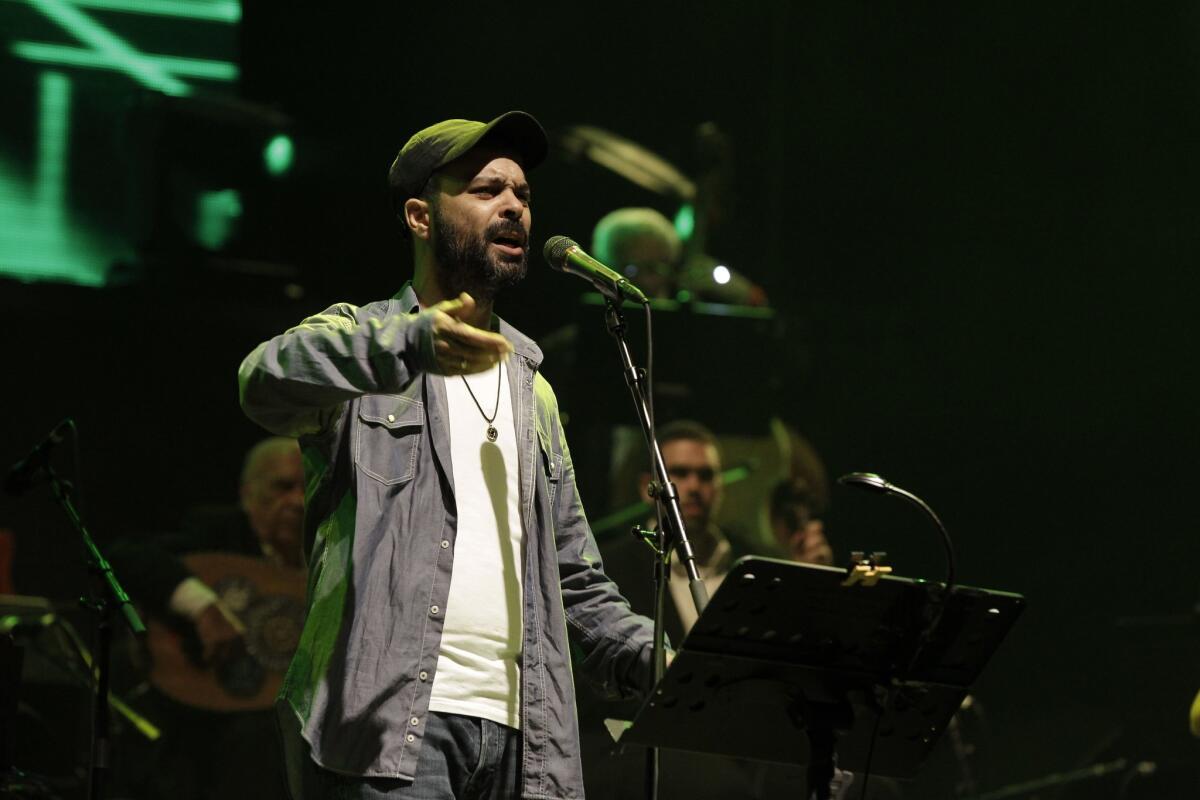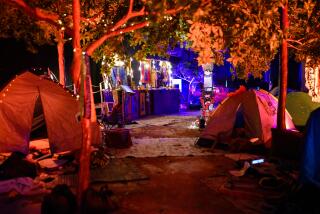Violent images in Israeli pop song stir controversy

- Share via
Reporting from Jerusalem — In Israel these days, art and politics are a discordant mix.
An Israeli pop star who wrote an inflammatory song he said was intended to decry violence was banned Tuesday from performing at an upcoming event sponsored by Israel’s presidency.
Singer Amir Benayoun’s new single – hugely shared in recent days on Hebrew-language social media – features a fictional Arab narrator who talks about wanting to stab Jews. Stabbings have played a prominent role in a wave of recent attacks against Israeli Jews by Palestinian assailants.
Benayoun said the song “Ahmad Loves Israel” was inspired by recent violence, but was not meant in any way to celebrate it, or to incite vigilante-style action against attackers. But President Reuven Rivlin’s office said the singer had been disinvited from an event next week commemorating the 20th century Jewish exile from Iran and neighboring Arab countries.
“Amir Benayoun is a renowned and exceptional artist,” the director-general of the president’s residence, Harel Tubi, wrote to the event organizers. “However, his statements made at this time of conflict and tension, even if uttered out of frustration and pain, do not, to say the least, help bring calm to the streets.”
That in turn drew accusations of censorship from Benayoun’s defenders, who said artistic expression was not a matter for the president or the government to judge.
The character in the song, meant to be speaking as an Arab from Jerusalem, sings about how “the moment … you turn your back on me, I’ll stick a sharpened axe in it.”
Several Palestinians from traditionally Arab east Jerusalem, whose residency permits grant them the right to move freely about the city, have been involved in recent attacks that have killed 11 people on the Israeli side in the last five weeks, including four U.S. citizens.
Those assaults included last week’s bloody storming of a Jerusalem synagogue by Palestinian assailants armed with a gun and meat cleavers, which left five dead; the attempted assassination earlier this month of a Jewish activist leading the fight for Jews to be allowed to pray at a contested holy site; and two separate episodes of pedestrians being rammed by Palestinian motorists while waiting at tramway stops.
On social media, Benayoun said the song was meant to “express emotions only, not to call for any sort of violence against any person. … If we were violent, we wouldn’t sing songs of pain that burst straight from the heart.”
Tensions have soared over the Israeli government’s response to the recent attacks, including reviving the practice of demolishing attackers’ family homes and threats to revoke the Jerusalem residency of not only attackers but also their relatives.
In addition, Israel’s Cabinet this week approved a measure affirming the country as the “nation-state” of the Jews, a bill whose wording was criticized for opening the door to discrimination against Arab citizens of Israel and placing Israel’s Jewish character over its democratic one.
Negotiators are working on a new version, to be brought to lawmakers next week, but the struggle over the bill threatens to break apart the fragile governing coalition.
Other upcoming cultural events are causing controversy as well. Conservative lawmakers are upset about a film festival set in Tel Aviv later this month, organized around the theme of what Palestinians call the “nakba” – the “catastrophe” of their displacement upon the creation of the state of Israel.
Cabinet minister Limor Livnat called for withholding any financial support for the festival, but organizers said they were not drawing on public funds.
King is a Times staff writer, and Sobelman a special correspondent.
Twitter: @laurakingLAT
More to Read
Sign up for Essential California
The most important California stories and recommendations in your inbox every morning.
You may occasionally receive promotional content from the Los Angeles Times.










